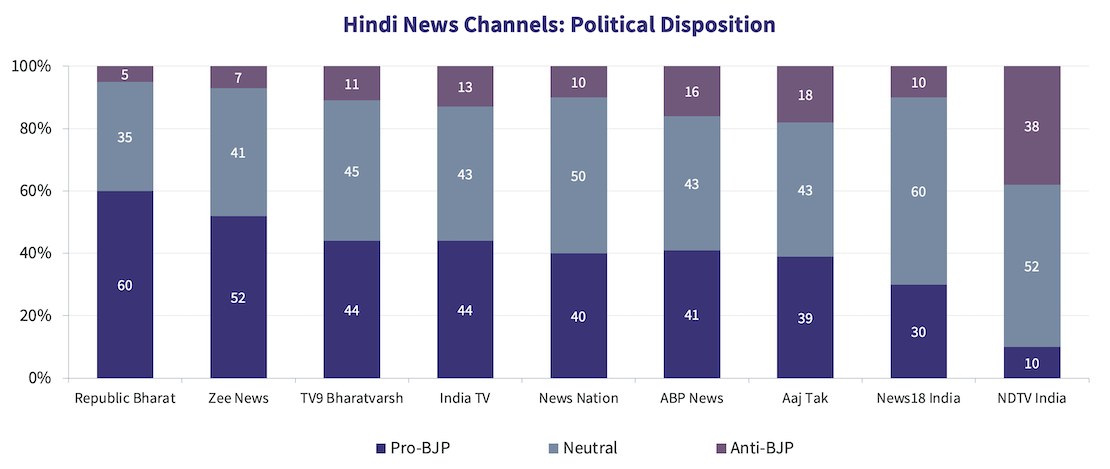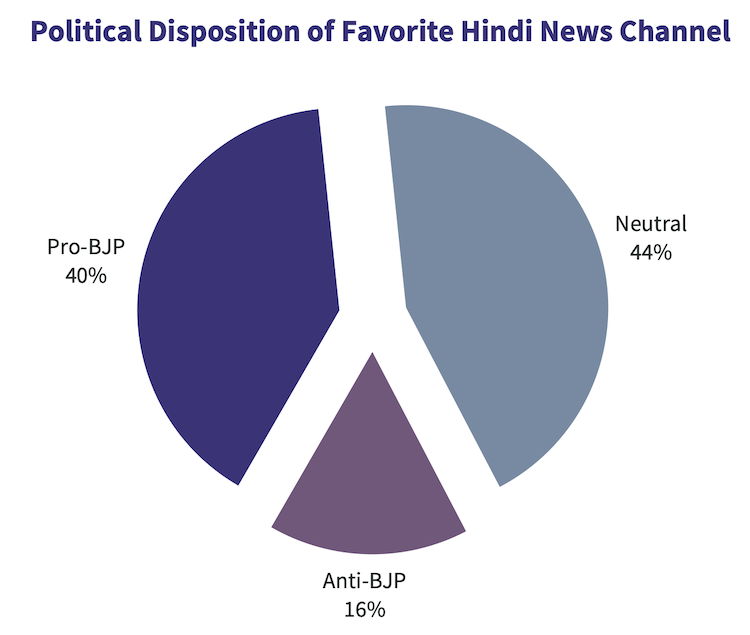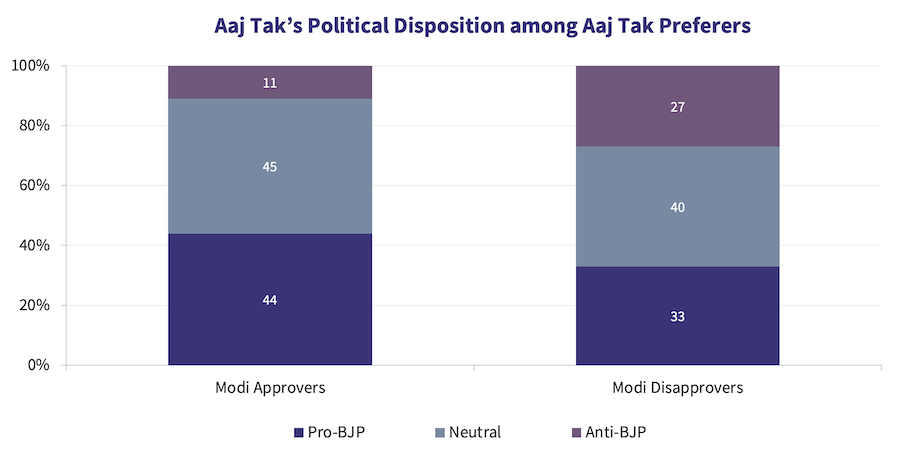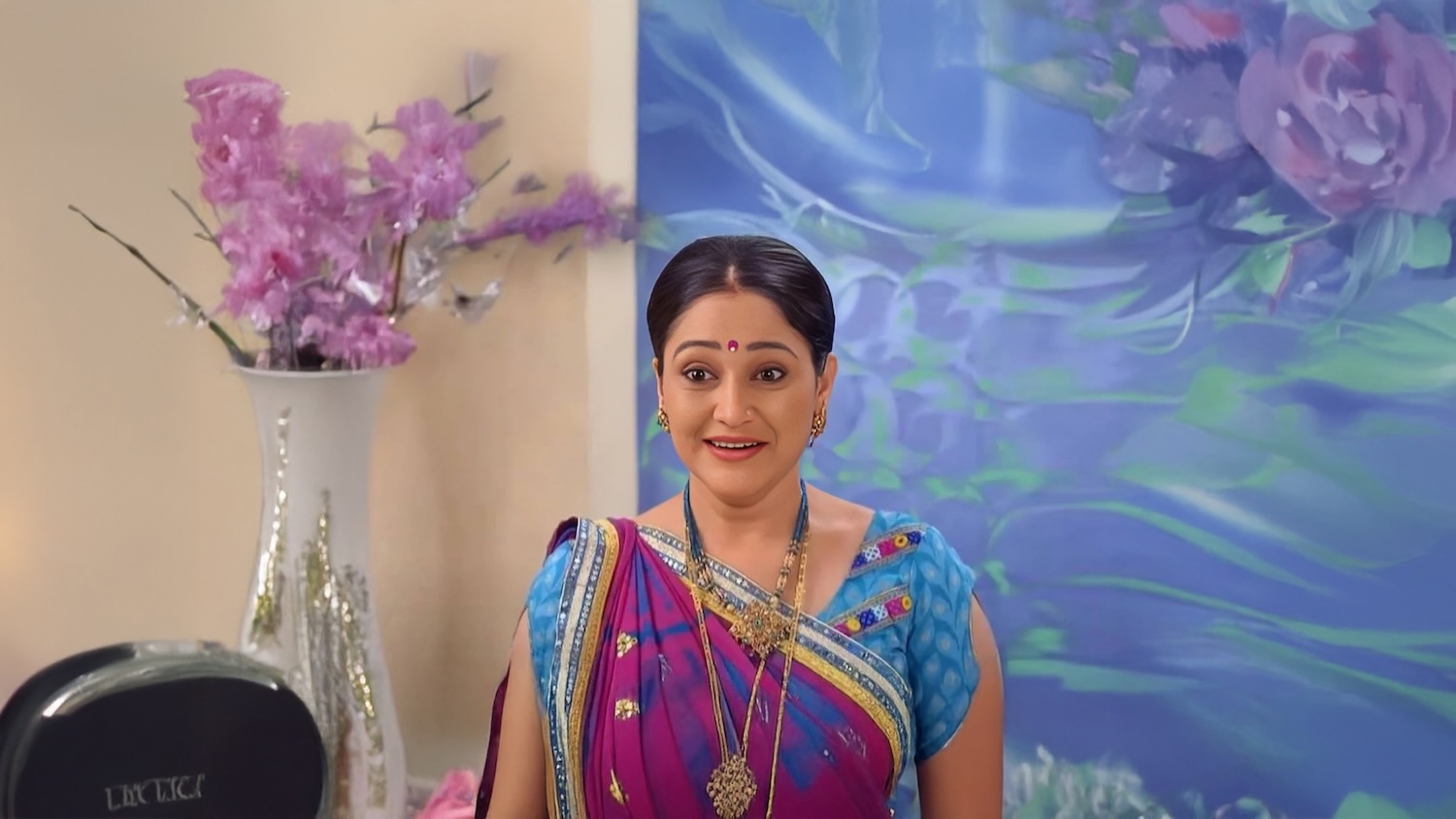


Political neutrality is almost definitional to good journalism. In the late 80s and the early 90s, when I was in my teens, I learnt that being anti-establishment and questioning the Government in power is the duty of a good journalist, but without endorsing or repudiating any underlying ideology that the Government may espouse.
But 30 years later, we are in a different world, and my education above may almost sound old-school. Yet, through our consumer work in the news category across domains, the relevance of news credibility comes up consistently. This is also validated in our recent report Fact or Fake?, on the concerns news consumers have about fake news in India.
But is political neutrality a necessary condition for credibility? Can one love a news brand while knowing that it’s clearly politically aligned to the party in power (or to the opposition, for that matter)? We decided to find out by simply asking the consumers, in a research that covers 2,000 regular viewers of Hindi news television across urban Hindi-speaking markets.
From a list of nine Hindi news channels, we asked them to pick the channels they watched regularly. For each of the selected channels, we asked them if they thought the channel supports the BJP, opposes the BJP or is generally balanced and neutral. Those who said they don't watch the channel enough to have a view have been excluded from this analysis. The chart below shows the results, with the universe for each channel being its regular viewer base.

The results tell a story of their own. Eight out of nine channels show a political disposition that’s clearly pro-BJP, though the degree varies significantly. It’s as high as 55% (the blue minus the purple in the chart) for Republic Bharat, and 25%, 21% and 20% for ABP News, Aaj Tak and News18 India respectively on the lower side. At the other end of the spectrum is NDTV India, at -28%, a clear anti-BJP disposition.
This analysis may come across as uncomfortable truth on the state of the Indian news media (at least as far as Hindi news is concerned), but that’s about it. These numbers tell us there’s a ‘problem’ with the news media, but they don’t tell us whether the consumer thinks of it as a problem. The following analysis answers that question.
We also asked the audience to pick their favorite Hindi news channel from the nine. If political neutrality of media is a virtue indeed, we would expect audience to pick a channel they consider neutral (there is a lot of grey in the chart above to make that selection). Let’s see if that happened.

No, it didn’t! I thought this finding is surprising, almost counter-intuitive, because the favorite channel data is evidently not impacted by the idea of political neutrality. The net (blue minus purple) score here is 24%, which means that for a sizeable section of Hindi TV news audience, their favorite channel is a channel they believe is pro-BJP. The data tells us, and in no uncertain way, that preference for a news brand does not require the brand to be politically neutral.
Preference and credibility are deeply linked. In a different study conducted last year, 87% news audience felt their favorite channel was “highly credible”. Hence, we can conclude that a (Hindi) news channel can be credible despite being politically disposed towards one side or the other.
Does the audience’s perception of BJP (and the Modi Government) impact their idea of neutrality? To understand this, we asked the same audience to rate the Central Government led by Prime Minister Modi. This is the question we use to calculate our PM Approval Ratings every week, an explainer on which you can read here.
A huge 41% of the sample picked Aaj Tak as their favorite channel, more than twice any other channel in the list. We divided these Aaj Tak Preferers into two segments based on their rating of the Modi Government: Modi Approvers and Modi Disapprovers. Does the view of their favorite channel (i.e., Aaj Tak) change for these two segments?

Yes, it does. Among Aaj Tak Preferers who are Modi Approvers, the perception that Aaj Tak is pro-BJP is a lot more resounding than among Aaj Tak Preferers who are Modi Disappovers. But it’s the 33% number in the chart above (the blue block on the right) that fascinated me. These people (122 in number, no less, out of the 2,000 sample) do not approve of Modi Government’s performance, think Aaj Tak speaks in favor of BJP, and yet, find themselves gravitating towards Aaj Tak as their favorite channel.
One may be tempted to dismiss it as one of those unexplainable things research throws up, but I see where these people may be coming from. They are being able to disassociate the idea of news credibility from politics, in their minds. Credibility is often built by providing authentic news around topics of public interest. So, a Modi Disapprover who believes that Aaj Tak is pro-BJP may choose to live with it, because Aaj Tak does everything that’s apolitical (COVID updates, city news, sports, the works) very well. Or simply because Aaj Tak has good anchors.
Hence, we can conclude that the construct of political neutrality of media is not a very strong consumer construct. The news business is a ‘social’ business, and it should not be defined and operated only by consumer constructs, but also by social constructs on the role and responsibility of news media in shaping a democracy. But that's another topic for another day.

Introducing Ormax Media Affluence (OMA)
OMA is a new audience classification system designed specifically to measure affluence level of audiences in context of the media & entertainment sector in India

Venn It Happens: OTT & Linear TV audience intersection
The first edition of our new feature Venn It Happens illustrates the intersection between OTT and Linear TV audiences in India, using data from The Ormax OTT Audience Report: 2025

Not just nostalgia: Why legacy characters are dominating HGECs
Despite not featuring in the show since 2017, Daya (Taarak Mehta Ka Ooltah Chashmah) continues to enjoy immense popularity among Hindi GEC audiences. Her enduring success highlights a category trend
Subscribe to stay updated with our latest insights
We use cookies to improve your experience on this site. To find out more, read our Privacy Policy